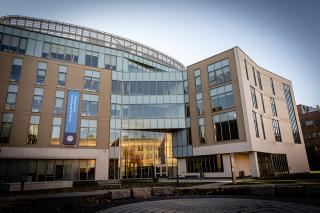Social activism has been a massive part of Professor Teresa Nelson’s life and teaching. “I weave opportunities to think about social issues and social justice into my classes, and they are more effective as a result,” says Nelson. Her areas of expertise are strategic management and entrepreneurship, but she’s become increasingly involved in activism.
“My life was changed by Black Lives Matter,” says Nelson, “and I want to bring that energy and that sensibility into the classroom. I know that students share that with me. At Simmons, it is a priority and part of our mission.”
Professor Nelson was one of the driving forces behind the new School of Business minor, Leadership for Social Impact. “The minor speaks to a cross-campus audience,” she says. “The skills developed are life skills — they can complement any course of study or professional goal.”
In the spring, Nelson will teach BUS 224: "Social Action Leaders," an elective for the minor and one of the University's designated service-learning courses, which offers undergraduate students the opportunity to get involved in their community and take a leadership role. While traditional volunteer opportunities are not possible due to the COVID-19 pandemic, the virtual format will allow students to focus on the action learning component.
“Rather than give the students a ready-made project, I believe that learning is in making decisions,” explains Nelson. “What decisions do you have to make when you see what you want to accomplish?”
The Social Action Leaders course will teach students how to make social change by studying how social movement campaigns are constructed organizationally, and then students will build their own. This project involves organizing a HeForShe campaign under the umbrella of the United Nations Global Solidarity Movement for Gender Equality — the goal is to bring all genders together to support women’s equity worldwide.
As HeForShe is global, “you have to apply a cultural lens to what gender equity is and how it is expressed,” says Nelson. “You have to grapple with the fact that how you define gender equity and feminism in a US context may be very different if you are in South Africa or Myanmar. I think that is valuable for undergraduate students in the US to learn.”
And it’s vital that they learn it. “Twenty-year-olds are socially minded leaders,” says Nelson. “And they are changing the world. Look at Greta Thunberg, Shamma bint Suhail Faris Mazrui, and Malala Yousafzai. This is not restricted to someone who is older and experienced.”
Nelson signals the importance of broad involvement and understanding. She explains that those who are underrepresented and face discrimination embedded in their societies are not the ones who are responsible for carrying the weight of social change. “We’re all responsible and capable, and we can do it.”
Nelson also stressed the value of business skills in any career. “Knowing how to work within organizations, knowing how to negotiate, knowing how to come up with a project plan, knowing how to communicate with audiences (digitally and in-person), these are business skills. No matter what you do in your professional life, you will benefit from developing these skills. And to have a positive impact on the world, these skills are essential.”

